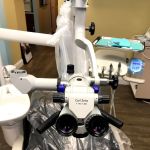
The Importance of Dental Care During Pregnancy
Pregnancy is a beautiful and exciting time in a woman's life, but it also brings unique health challenges. One of the most overlooked aspects of pregnancy health is dental care. While it may not seem directly related to the baby's development, maintaining good oral health during pregnancy is crucial for both the mother and her growing baby.
Why Is Dental Care Important During Pregnancy?
During pregnancy, hormonal changes can affect your oral health in a number of ways. Pregnant women are at a higher risk of gum disease, cavities, and other dental issues due to changes in hormone levels, particularly increased progesterone. This hormone affects your gums and can make them more prone to infection and inflammation. Additionally, morning sickness, which many women experience in the early stages of pregnancy, can lead to acid erosion on the teeth from frequent vomiting.
The Risks of Neglecting Oral Health During Pregnancy
Failing to maintain oral health during pregnancy can lead to severe complications. Poor dental care can lead to gum disease, which is linked to an increased risk of preterm birth, low birth weight, and other complications. Gum disease during pregnancy can also affect the mother's health by increasing the risk of cardiovascular problems. Therefore, it's essential to make dental care a priority during this time.
Essential Tips for Maintaining Oral Health During Pregnancy
Maintaining healthy teeth and gums during pregnancy requires a few extra steps and attention to detail. Here are some essential tips to help ensure you have a healthy smile throughout your pregnancy:
1. Maintain a Consistent Oral Hygiene Routine
Good oral hygiene begins with regular brushing and flossing. Brush your teeth at least twice a day using a fluoride toothpaste to remove plaque and food particles. Don’t forget to floss once a day to prevent the buildup of plaque between your teeth and gums. If you have trouble with morning sickness and vomiting, rinse your mouth with water or a mild mouthwash to neutralize acid without brushing immediately after vomiting, as this can damage tooth enamel.
2. Visit Your Dentist Regularly
It's essential to keep up with your dental check-ups during pregnancy. Make sure to schedule a dental visit early in your pregnancy to discuss your oral care and any concerns. Dentists can provide a professional cleaning, check for cavities, and ensure that your gums are healthy. If you're experiencing gum swelling or bleeding, let your dentist know, as this could be a sign of pregnancy gingivitis.
3. Watch Your Diet
Your diet plays a significant role in your oral health. Eating a balanced diet rich in calcium, vitamins, and minerals will support the health of your teeth and gums. Avoid sugary snacks and drinks, as sugar can increase the risk of cavities. Eating nutrient-dense foods, including fruits, vegetables, lean proteins, and dairy, will help keep your teeth strong and your gums healthy.
4. Manage Morning Sickness Effectively
Morning sickness can be tough, and frequent vomiting can erode tooth enamel. To protect your teeth, rinse your mouth with water or a fluoride mouthwash after vomiting. If possible, avoid brushing your teeth right after vomiting as the enamel is softened by the stomach acids. Wait about 30 minutes before brushing to allow the enamel to harden again.
5. Look for Signs of Gum Disease
During pregnancy, your risk for gum disease (also known as periodontal disease) is higher. Symptoms to watch for include swollen, red, or bleeding gums. If you notice any of these signs, visit your dentist as soon as possible. Early treatment can prevent the disease from progressing and protect both your oral health and your baby's health.
Pregnancy and Oral Health: Real-life Experiences
Many women experience unique challenges during pregnancy, and oral health is no exception. Take the story of Sarah, a first-time mom, who experienced severe morning sickness in her first trimester. "I had terrible nausea, and it felt like I was vomiting constantly," Sarah recalls. "I didn’t realize how much it was affecting my teeth until I visited my dentist. Thankfully, I was able to start a new routine that helped protect my teeth." Sarah’s experience highlights the importance of proactive dental care during pregnancy.
Oral Health Myths and Facts During Pregnancy
There are many misconceptions about dental care during pregnancy, and it’s important to distinguish fact from fiction:
- Myth: Pregnancy makes dental visits dangerous for the baby.
- Fact: Dental treatments like cleanings and even fillings are generally safe during pregnancy. In fact, it’s better to address dental issues early on to prevent more serious problems.
- Myth: Pregnancy gingivitis is a normal part of pregnancy and can’t be avoided.
- Fact: While hormonal changes do increase the risk of gingivitis, regular brushing, flossing, and dentist visits can help prevent it from becoming severe.
Conclusion: Protect Your Smile and Your Baby
Maintaining good oral health during pregnancy is an essential part of overall wellness for both you and your baby. By following simple dental care practices such as regular brushing, flossing, and visiting your dentist, you can prevent issues like gum disease and cavities, which can affect your pregnancy. Be proactive about your oral health and ensure a bright, healthy smile throughout your pregnancy journey.







 South Shore Dental Care: Dory Stutman, DDS5.0 (7 review)
South Shore Dental Care: Dory Stutman, DDS5.0 (7 review) Dr. Jack Sabol3.0 (3 review)
Dr. Jack Sabol3.0 (3 review) Dr. Amy James & Associates Orthodontists4.0 (179 review)
Dr. Amy James & Associates Orthodontists4.0 (179 review) Main Street Pediatric Dentistry: Penny Resnick-Graulich DMD4.0 (785 review)
Main Street Pediatric Dentistry: Penny Resnick-Graulich DMD4.0 (785 review) Sunnymead Ranch Dental Center4.0 (465 review)
Sunnymead Ranch Dental Center4.0 (465 review) Skyline Healthy Smiles Family Dental, P.A.4.0 (129 review)
Skyline Healthy Smiles Family Dental, P.A.4.0 (129 review) The Importance of Oral Health Education During Pregnancy for a Healthy Pregnancy
The Importance of Oral Health Education During Pregnancy for a Healthy Pregnancy Best Tips for Brushing Your Teeth Properly for Healthy Gums: Essential Techniques for Oral Health
Best Tips for Brushing Your Teeth Properly for Healthy Gums: Essential Techniques for Oral Health Why Skipping Dental Checkups Can Lead to Bigger Oral Health Problems
Why Skipping Dental Checkups Can Lead to Bigger Oral Health Problems Advantages of Porcelain Dental Restorations
Advantages of Porcelain Dental Restorations How Can Diabetes Cause Tooth and Gum Problems? Preventing and Managing Oral Health Issues
How Can Diabetes Cause Tooth and Gum Problems? Preventing and Managing Oral Health Issues Healthy Habits for Promoting Good Oral Health and Hygiene: Tips for a Healthy Smile
Healthy Habits for Promoting Good Oral Health and Hygiene: Tips for a Healthy Smile